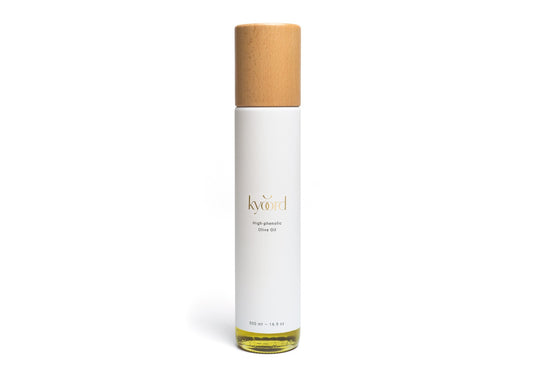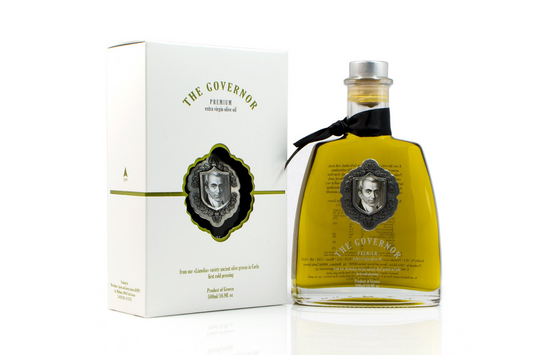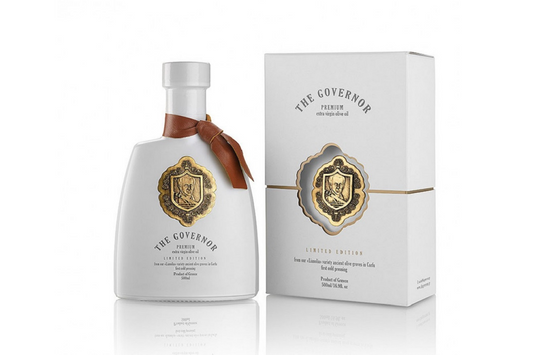Blog post updated: September 2025
The ideal olive oil daily dosage is 1 tablespoon (15ml) of high-phenolic extra virgin olive oil per day for a healthier lifestyle and disease prevention, or 2 tablespoons (30ml) daily to improve pre-existing conditions. Based on extensive scientific research, consuming this olive oil dosage per day provides optimal health benefits when using high-quality, medicinal olive oil like kyoord EVOO. Our team of scientific experts has reviewed numerous human studies to determine that 20 grams of olive oil per day (approximately one and a half tablespoons) consistently appears across research showing improved clinical symptoms and health outcomes.
However, it's crucial to understand that not all olive oils are created equal. What factors determine the quality and therapeutic potential of the final EVOO product?
- The origin of the olives
- Time of harvest
- Method of extraction
Recent research has revealed concerning truths about olive oil authenticity and quality, making it essential to choose high-phenolic varieties. Low-phenolic extra virgin olive oils may require you to consume upwards of half a cup to reap the same benefits of just a tablespoon of high quality, medicinal olive oil.

Health Benefits of Olive Oil
The studies our experts reviewed to make a dosage recommendation have encouraging findings about the link between EVOO consumption and improved clinical symptoms. Research has even shown that olive oil intake is tied to reduced mortality, emphasizing its many health benefits.
Despite the large variability in the aspect of human health being studied and the brands of olive oil used in the studies, one thing common to many of these studies was the use of 20 grams of olive oil per day (one and half tablespoons). These are 4 EVOO health benefits.
Reduced Inflammation
Research consistently shows that consuming 1-2 tablespoons of olive oil daily can significantly reduce inflammation in the body. Studies demonstrate decreased inflammation among those who consume olive oil daily.
Clinical trials specifically highlight how high phenolic olive oil boosts antioxidants and reduces inflammatory markers. For those suffering from arthritis, research shows promising results with oleocanthal for arthritis management.
High-quality extra virgin olive oil contains oleocanthal, a natural compound with anti-inflammatory properties similar to ibuprofen. The monounsaturated fats in olive oil help reduce inflammatory cytokines, making it particularly beneficial for combating chronic diseases and supporting overall cellular health.
Lower Incidence of Diabetes
Studies demonstrate that incorporating olive oil into your daily routine can help regulate blood sugars and significantly reduce diabetes risk. Research shows a lower incidence of diabetes among those who consume olive oil daily.
high-polyphenol extra virgin olive oil serves as your secret weapon against metabolically unhealthy obesity, a key risk factor for type 2 diabetes. The healthy fats in olive oil help improve insulin sensitivity and slow the absorption of sugars into the bloodstream, making it an excellent choice for metabolic health.
Improved Heart Health
Perhaps the most well-documented benefit of consuming olive oil is its impact on cardiovascular disease prevention. Studies show improved cardiovascular health among people who consume 1-2 tablespoons of olive oil daily compared to those who avoid healthy fats.
The monounsaturated fat in olive oil helps reduce bad cholesterol levels while maintaining good cholesterol, supporting overall heart healthy function and reducing the risk of heart disease.
Enhanced Cognitive Function
Emerging research suggests that regular olive oil consumption may help protect brain health and cognitive function. Studies indicate improved cognitive function with daily olive oil consumption.
Recent studies show that olive oil consumption is linked to lower risk of dementia-related death, while extended use of high phenolic EVOO improves cognitive function in human subjects. Research demonstrates that the oleocanthal compound specifically benefits brain health through multiple pathways.
The anti-inflammatory compounds in extra virgin olive oil cross the blood-brain barrier, potentially reducing the risk of neurodegenerative diseases and supporting memory function.
Why High Quality EVOO Matters
While this information is helpful, and suggests that consumption of 1-2 tablespoons of olive oil each day is a good starting point to improve your health, it does not take into consideration the composition of the olive oil. It is well known that not all olive oils are created equal – the origin of the olives, time of harvest, and method of extraction are all crucial to determining the quality of the final product.
Medicinal olive oils are defined as those with high phenolic content. The highest possible concentration of these medically active compounds are acquired through an early harvest and precise extraction and manufacturing process.
The most health-conscious olive oils may boast features like 'early harvest' or 'high-phenolic', and pack in high amounts of triterpenes and phenolic compounds such as oleocanthal, oleacein, and hydroxytyrosol. When selecting olive oil for daily consumption, these compounds make the difference to receiving therapeutic benefits from your olive oil daily dosage.
How to Incorporate Olive Oil into Your Diet
Meeting your daily olive oil dosage doesn't require dramatic dietary changes. The bottom line? We recommend adding just one tablespoon a day for a healthier lifestyle and disease prevention, or at least two tablespoons daily to improve pre-existing conditions.
Here are practical ways to consume your recommended amount of olive oil per day:
-
Direct consumption: Many health-conscious individuals take a spoonful of olive oil directly. Here at Kyoord, all of our olive oils meet our high standards for medicinal properties and we offer daily shots to make the routine simple.
-
Mediterranean approach: Drizzle high-phenolic olive oil over salads, vegetables, and whole grain bread throughout your meals to naturally incorporate 1-2 tablespoons per day.
- Cooking applications: Use extra virgin olive oil for low to high-heat cooking, though direct consumption or finishing dishes provides maximum therapeutic benefit. Contrary to popular belief, high-quality EVOO is safe and healthy to use for high-heat cooking.
–––––––––––––––––––––––––––––––––––––––––––––––––––––––––––––––––––––––
| Daily Dosage Guide | Amount | Purpose |
|---|---|---|
| Disease Prevention | 1 tablespoon (15ml) | General health maintenance |
| Therapeutic Benefits | 2 tablespoons (30ml) | Improve existing conditions |
| Maximum Safe Dose | Olive oil is safe even in large quantities, but calorie rich | Intensive health support |
–––––––––––––––––––––––––––––––––––––––––––––––––––––––––––––––––––––––
Frequently Asked Questions
How much olive oil per day is too much?
Contrary to common concerns about weight gain, research actually shows that olive oil consumption is associated with weight loss when consumed as part of a balanced diet. Studies even suggest that olive oil may help prevent long-term weight gain due to its satiating properties and metabolic benefits.
Our recommendation of 1-2 tablespoons daily provides optimal benefits while supporting healthy weight management. Each tablespoon contains approximately 120 calories, but the high-quality fats and phenolic compounds help regulate appetite and metabolism. Importantly, there is no evidence of a maximum “unsafe” amount of olive oil—unlike other fats, olive oil is safe to enjoy freely. The only real limit comes from its calories, which should be balanced within your overall diet. A practical way to incorporate more olive oil is to use it in place of less healthy fats, such as butter or seed oils, so you gain its health benefits without adding excess calories.
However, the quality of your olive oil significantly impacts how much you need. Lower quality extra virgin olive oils may require you to consume upwards of half a cup to reap the same benefits of just a tablespoon of high quality, medicinal olive oil.
What's the difference between EVOO and regular olive oil?
Extra virgin olive oil (EVOO) is cold-pressed and unrefined, retaining all its natural antioxidants, vitamins, and beneficial compounds like oleocanthal, oleacein, and hydroxytyrosol. Regular or "light" olive oil is heavily processed, removing most health-promoting substances.
For therapeutic benefits, always choose extra virgin olive oil with high phenolic content. The processing used for regular olive oil strips away the polyphenols and anti inflammatory compounds that make olive oil so beneficial for heart health and inflammation reduction. It is well known that not all olive oils are created equal—the origin of the olives, time of harvest, and method of extraction are all crucial to determining the quality of the final product.
Should I take a spoonful of olive oil in the morning or at night?
Both timing options offer benefits, but consistency matters most. Many people find that consuming their olive oil daily dosage in the morning helps establish a consistent routine.
The most important factor is choosing a schedule and a routine you can maintain long-term to ensure you receive the daily dose of olive oil's health benefits. Whether you prefer direct consumption, like taking a kyoord daily shot, or incorporating it into meals, the key is making olive oil consumption a sustainable part of your daily routine.
Quality matters more than timing. High-quality, medicinal olive oils with features like 'early harvest' or 'high-phenolic' allow you to consume just 1-2 tablespoons per day.









